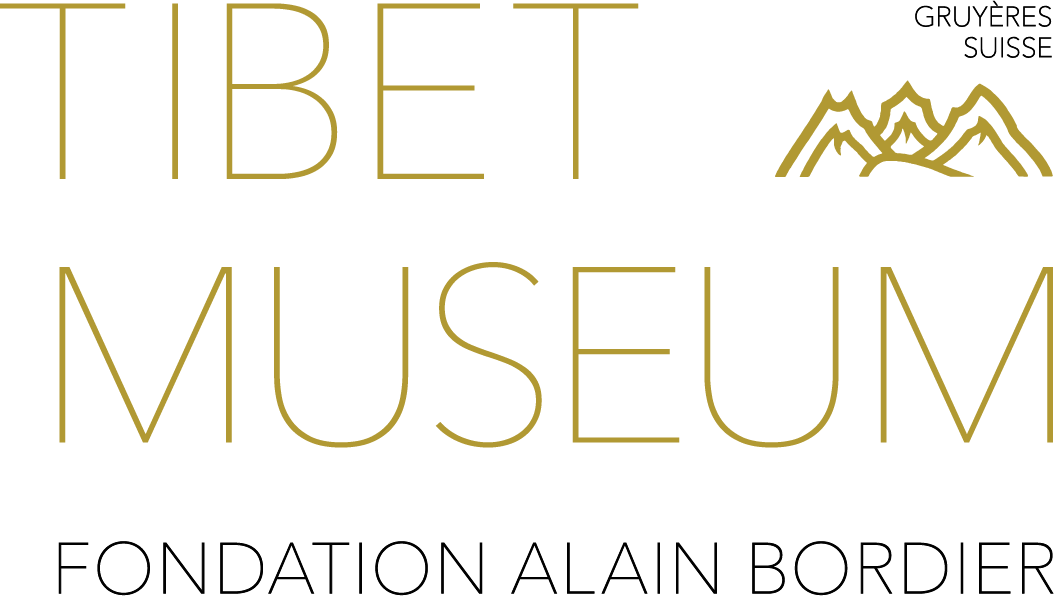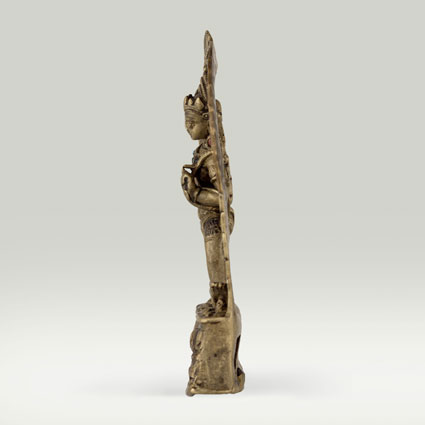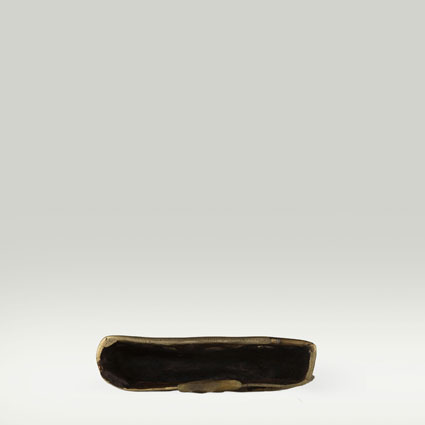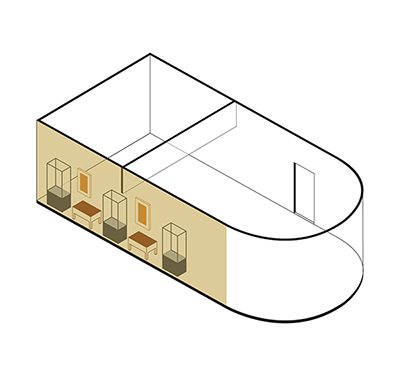ABS 050
Code: ABS 050
Country: Tibet
Style: Late Pala Style
Date: 1050 - 1150
Dimensions in cm WxHxD: 2 x 11.2 x 5.7
Materials: Brass
Achala, the immovable One
Achala is the destroyer of delusions and one of the protectors of Buddha’s teachings. Because of his role as a protector, Acala shows the fierce expression and attributes of a wrathful deity. He is frequently depicted with two protruding fangs. Sometimes one tooth points down, representing his compassion to the world, and the other points up, representing his passion for truth. Achala is often depicted with the Third Eye. He can be white (sita) or blue (nila).
Achala means "The Immovable One" in Sanskrit which refers to his ability to resist temptations. Frequently he stands on a rock or mountain to illustrate his affinity to these surroundings.
Stepping out to the right (pratyalidha), Achala stands on the Brahmanical God Ganesha with the right foot, and with the left foot on another Brahmanical deity, both lying on the lotus pedestal. He brandishes a sword (khadga) with his right hand, to show that he is "cutting through ignorance". With the left hand, displaying the threatening gesture, he holds a noose (pasha) at heart-level for catching and binding (inner) demons.
Achala is clad in a tiger skin (vyaghracarma) tied around his hips. He is crowned with two snakes (naga) in front of the prominent knot of hair in which a small effigy of Buddha Akshobhya, his lineage holder, is seated. Achala is adorned with a pair of circular earrings, two necklaces, and bracelets. His body is framed with a flaming aureole which represents the purification of the mind.
Basically, the stylistic features of this image follow the artistic tradition of the North-Eastern Indian Pala period of the 11th and 12th centuries. However, this statue has probably been manufactured by an Indian craftsman working in Tibet. This is clearly demonstrated by the design of the open-worked stand which is distinctively Tibetan in style, and does not follow the Pala tradition.
Achala is the destroyer of delusions and one of the protectors of Buddha’s teachings. Because of his role as a protector, Acala shows the fierce expression and attributes of a wrathful deity. He is frequently depicted with two protruding fangs. Sometimes one tooth points down, representing his compassion to the world, and the other points up, representing his passion for truth. Achala is often depicted with the Third Eye. He can be white (sita) or blue (nila).
Achala means "The Immovable One" in Sanskrit which refers to his ability to resist temptations. Frequently he stands on a rock or mountain to illustrate his affinity to these surroundings.
Stepping out to the right (pratyalidha), Achala stands on the Brahmanical God Ganesha with the right foot, and with the left foot on another Brahmanical deity, both lying on the lotus pedestal. He brandishes a sword (khadga) with his right hand, to show that he is "cutting through ignorance". With the left hand, displaying the threatening gesture, he holds a noose (pasha) at heart-level for catching and binding (inner) demons.
Achala is clad in a tiger skin (vyaghracarma) tied around his hips. He is crowned with two snakes (naga) in front of the prominent knot of hair in which a small effigy of Buddha Akshobhya, his lineage holder, is seated. Achala is adorned with a pair of circular earrings, two necklaces, and bracelets. His body is framed with a flaming aureole which represents the purification of the mind.
Basically, the stylistic features of this image follow the artistic tradition of the North-Eastern Indian Pala period of the 11th and 12th centuries. However, this statue has probably been manufactured by an Indian craftsman working in Tibet. This is clearly demonstrated by the design of the open-worked stand which is distinctively Tibetan in style, and does not follow the Pala tradition.






